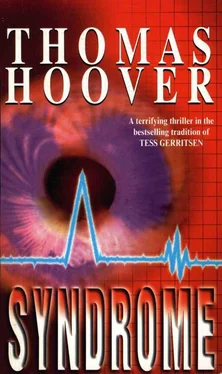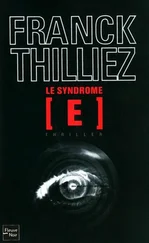Thomas Hoover - Syndrome
Здесь есть возможность читать онлайн «Thomas Hoover - Syndrome» весь текст электронной книги совершенно бесплатно (целиком полную версию без сокращений). В некоторых случаях можно слушать аудио, скачать через торрент в формате fb2 и присутствует краткое содержание. Жанр: Триллер, на английском языке. Описание произведения, (предисловие) а так же отзывы посетителей доступны на портале библиотеки ЛибКат.
- Название:Syndrome
- Автор:
- Жанр:
- Год:неизвестен
- ISBN:нет данных
- Рейтинг книги:4 / 5. Голосов: 1
-
Избранное:Добавить в избранное
- Отзывы:
-
Ваша оценка:
- 80
- 1
- 2
- 3
- 4
- 5
Syndrome: краткое содержание, описание и аннотация
Предлагаем к чтению аннотацию, описание, краткое содержание или предисловие (зависит от того, что написал сам автор книги «Syndrome»). Если вы не нашли необходимую информацию о книге — напишите в комментариях, мы постараемся отыскать её.
Syndrome — читать онлайн бесплатно полную книгу (весь текст) целиком
Ниже представлен текст книги, разбитый по страницам. Система сохранения места последней прочитанной страницы, позволяет с удобством читать онлайн бесплатно книгу «Syndrome», без необходимости каждый раз заново искать на чём Вы остановились. Поставьте закладку, и сможете в любой момент перейти на страницу, на которой закончили чтение.
Интервал:
Закладка:
"Well," Bartlett went on, "Karl thinks he's got a new idea that might save us. Hampton is supposed to be on the case this very morning." He stared out the chopper's window, down at the rooftops of his empire. At the north end of the industrial park was the main laboratory, where stents and titanium joint replacements were tested on animals-mostly sterile pigs, though some primate testing also was under way. The central area had two large manufacturing facilities where the more complex devices were made.
The buildings were all white cinder block, except for the one they were hovering above now. It was at the far south end, a massive three-story mansion nestled among ancient pines and reached by a long cobblestone driveway. Though it was actually the oldest building of the group by a hundred years, it was the latest acquisition for the complex. It fronted a beautiful ten-acre lake, and had been a summer palacio of a nineteenth-century railroad baron. Around mid-century it was turned into a luxury retirement home, complete with nursing services. Its ornate appointments reminded patients of the Frick Gallery, if one could imagine those marble halls teeming with wheelchairs and nurses.
Bartlett had bought the defunct manufacturing complex next to it eighteen years earlier for the BMD industrial park, but it was only six years ago that the owners of the mansion, a group of squabbling heirs, finally relented and agreed to part with the property. It was now a flagship holding of BMD.
He had an eye for design and he had loved remodeling the old mansion and making it into a modern clinic and research facility. He had renamed it the Dorian Institute and moved in Karl Van de Vliet and the research staff of the Gerex Corporation. He also had put a landing pad on the expansive roof, along with a stair leading down to an elevator that could take him directly to the laboratory in the basement.
Kenji Noda settled the McDonnell Douglas onto the pad and cut the engines. Bartlett never let himself worry about the noise. The patients in the clinical trials were here at no charge, so they really couldn't complain, particularly since they were now part of what was possibly turning out to be the greatest advance in the history of medicine. If your Alzheimer's had just been reversed at no charge, you weren't going to complain about a little hubbub on the roof.
"I'll wait here," Noda said opening the side door. His bald pate, reminiscent of an eighteenth-century samurai, glistened in the early spring sun.
Bartlett nodded, knowing that his pilot did not trust physicians and hospitals. Taking care of your body was your responsibility, Kenji Noda frequently declared and he trained his own daily. He ate no meat and drank gallons of green tea. When he practiced kendo swordplay, he had the reflexes of a man half his age. He never discussed why he had left Japan, but Bartlett assumed it was for reasons best left in the dark.
Bartlett headed down the metal stairs leading to the self-service elevator. This daily ordeal of flying out to give a blood sample and to see Kristen was increasingly unsettling. As he inserted his magnetic card into the elevator security box, he felt his hand shaking slightly.
So close to the eternal dream of humankind. So close. How was it going to end?
Sunday, April 5
8:38a.m.
"Dr. Vee, I'm feeling so much better, I can't tell you." Emma Rosen reached out and caught her physician by the collar of his lab coat, pulling him down and brazenly bussing his cheek. She'd been longing to do this for three weeks but hadn't mustered the nerve until now. "This morning I climbed the stairs to the third floor, twice, up and back without any chest pain. Oy, can you believe? It's a miracle."
Karl Van de Vliet was a couple of inches over six feet, with a trim face and sandy hair that some older patients judged too long for a physician. His English normally was perfect, though sometimes he made a mistake when trying to sound too colloquial. But everyone, young and old adored his retiring Dutch manner and those deep blue eyes that carried some monumental sadness from the past. They also were sure he would soon be recognized worldwide as the miracle worker he was. The prospect of a Nobel didn't actually seem that far-fetched.
"Emma, please, I begged you to rest." He sighed and checked the dancing electronic pens of her EKG. They were in the basement of the Dorian Institute. Upstairs, the "suites"-nobody called them rooms-were intended to invoke a spa more than a clinic, so most of the heavy-duty diagnostic equipment was kept in a row of examining rooms down near the subterranean lab. "For another week at least. Why won't you listen? You've been a very naughty girl. I may have to tell your daughter."
He glanced at the seventy-three-year-old woman's readout one last time, made a quick note on his handheld computer, and then laid a thin hand across her brow for a fleeting, subjective temperature check.
She's all but fully recovered, he told himself. It's truly astonishing.
Five weeks earlier, she had come through the front door of the Dorian Institute in a wheelchair pushed by her youngest, a bottle blonde named Shelly. He took one look and scuttled the normal security precautions, the frisk for cameras and recording devices. Emma's low cardiac output had deteriorated to the point that her left leg below the knee was swollen to almost twice its normal size, owing to renal retention of fluid, and she was so short of breath she required oxygen. He hadn't wanted to complicate the clinical trials by taking on another patient at that late date, but she had been referred by a physician friend in the city, begging. How could he turn her away?
He had removed a microscopic amount of bone marrow from her right ankle, extracted the stem cells, applied the hormonal signal that told them to develop into heart muscle, and then injected a thriving cell factory into her heart. Since stem cells could be made to ignore the body's rules to stop replicating after a certain number, they were able to reproduce forever, constantly renewing themselves. The only other cells with that immortal characteristic were cancer cells. In fact, it was as though he had given Emma a new kind of cancer-one that produced cells as healthy as those in a newborn. Today she probably could have run up those stairs.
Although his stem cell technology was going to create a new era in regenerative medicine, he had experienced his share of bumps in the road. Five years earlier, Stanford University had canceled his research project there since the work he had been doing involved the special stem cells in unused fertility-clinic embryos. The university claimed there had been death threats to its president. The Board of Regents had finally decided with a sham show of remorse, to revoke his funding. They called him in one sunny afternoon in May and pulled the plug. He thanked them and tore up his contract. By that time he had already demonstrated that, using the right chemical signals, stem cells could be coaxed into becoming almost any organ. Inserted into the heart, they became new heart muscle, replacing scars; inserted into the brain, they became neural tissue. No way was he going to be stopped now. They didn't know what they were losing.
What he needed was a "white knight." He did some poking around and came up with Winston Bartlett, then floated feelers to Bartlett's people. What if, he proposed, Bartlett acquired the Gerex Corporation for BMD and made it a for-profit business? No more public funding (and maddening administrative meddling). The research already completed was so close to a payoff, after years and years of grinding lab work and thousands of white mice, that the deal could be considered an investment where 95 percent of the seed money had already been supplied by taxpayers.
Читать дальшеИнтервал:
Закладка:
Похожие книги на «Syndrome»
Представляем Вашему вниманию похожие книги на «Syndrome» списком для выбора. Мы отобрали схожую по названию и смыслу литературу в надежде предоставить читателям больше вариантов отыскать новые, интересные, ещё непрочитанные произведения.
Обсуждение, отзывы о книге «Syndrome» и просто собственные мнения читателей. Оставьте ваши комментарии, напишите, что Вы думаете о произведении, его смысле или главных героях. Укажите что конкретно понравилось, а что нет, и почему Вы так считаете.












